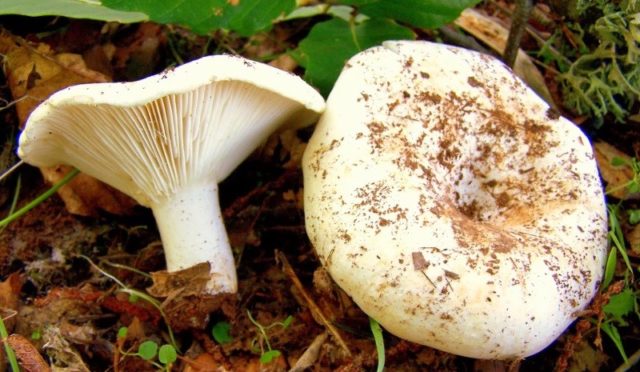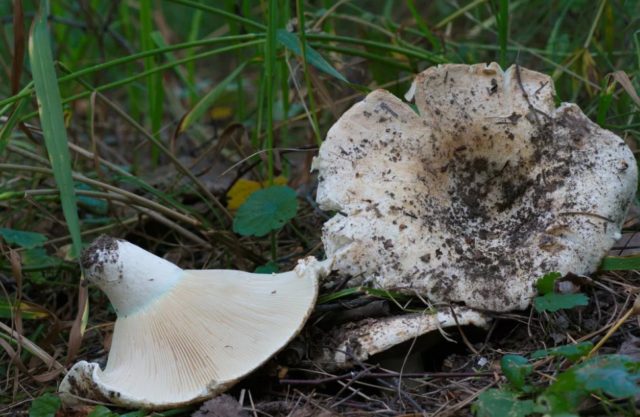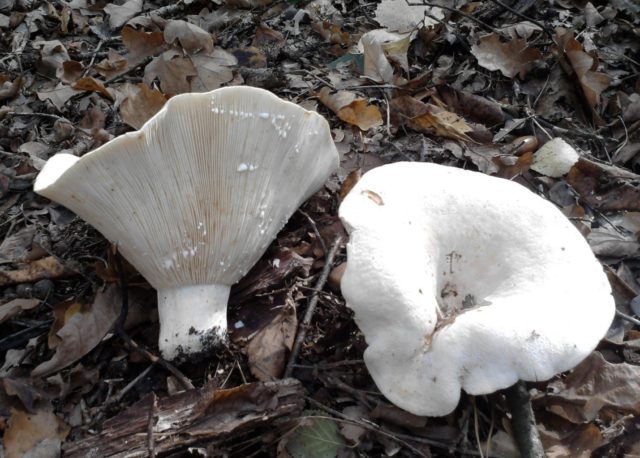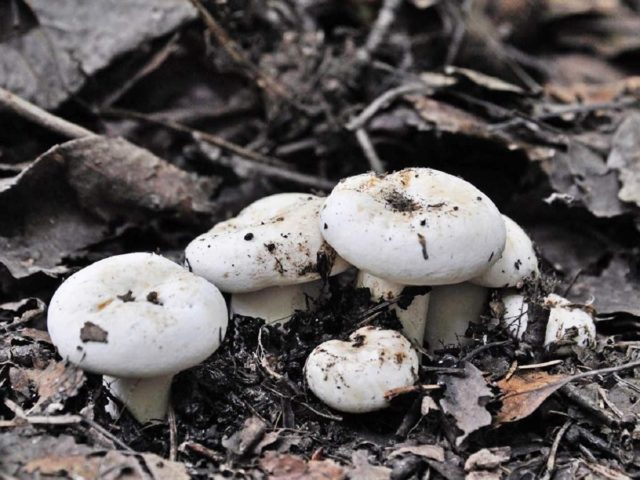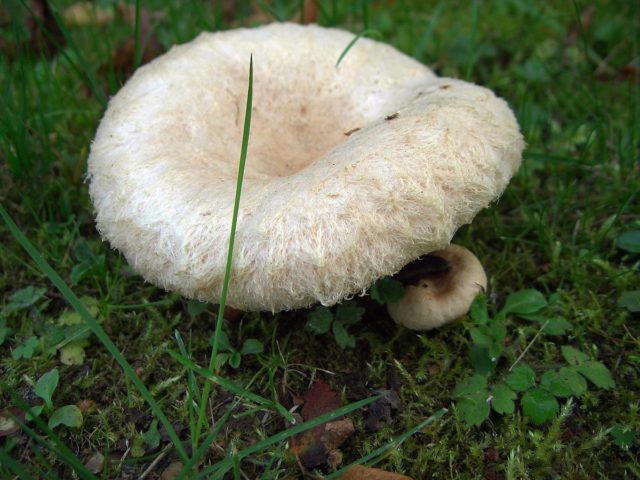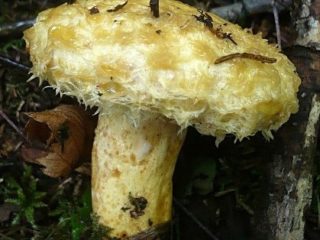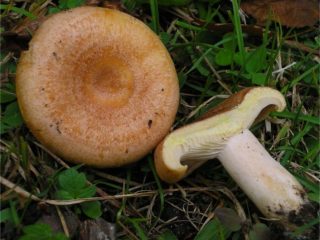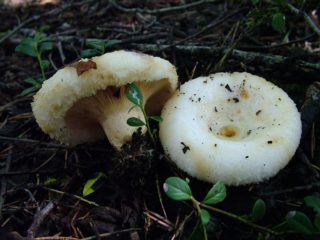Content
White podgruzdok, or as it is also called, dry milk mushroom, is found in forests quite often. Many mushroom pickers consider this mushroom a type of milk mushroom, but this is wrong. White podgruzdok has nothing to do with milkmen and is one of the representatives of the russula genus.
What does dry milk look like?
The white podgruzdok, the photo and description of which is given below, really has a certain resemblance to an ordinary pork bag. This is the reason for the similarity of the names.
The photo above shows what a dry lump looks like. The mushroom has a traditional shape with a pronounced head and stem. Can reach significant sizes. The dry milk mushroom has quite a few synonymous names, in various sources you can find its photo and description under the following names:
- Load the white one.
- Rusk (rusks, rusks).
- The russula is pleasant.
- The russula is excellent.
The Latin name for white podgruzdka is Russula delica. It belongs to the lamellar mushrooms of the russula genus.
Description of the hat
The white hat undergoes significant changes as he grows up. In young specimens, it is flattened semicircular, with strongly tucked edges. Gradually, it straightens out, becomes funnel-shaped, while the edges remain curled down. In the photo below - mushrooms crackers of different ages.
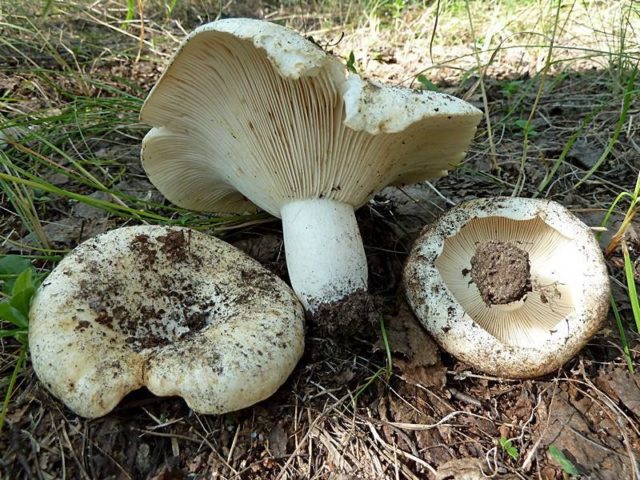
The white hat becomes funnel-shaped with age.
In older specimens, the funnel expands completely, taking a reverse conical shape. Moreover, its edges often crack. The diameter of an adult's cap can be up to 30 cm long. Initially, its color is white, but over time, yellow and brown embossed spots, resembling rust, begin to appear on it. In addition, a large amount of plant debris and soil adheres to the cap, which also affects its color.
On the reverse side there are numerous thin straight white plates, often with a greenish or creamy tint. At a more advanced age, sometimes brown spots may appear on them. The pulp is white, dense, has a pronounced mushroom aroma.
Leg description
The white leg is rather short, thick, massive, solid, dense to the touch. It has a cylindrical shape, while tapering slightly upward. The leg is white, in adult specimens, irregular dimples of a rusty brown color often appear on the surface.
How and where does the white load grow?
White podgruzd can be found in forests of any type, but in conifers it is much less common. The habitat of its growth is the temperate zone of both the European and Asian parts of Russia. Most often, this mushroom can be found on the edges, edges of forest roads, clearings, in mixed forests with a predominance of birch, aspen, less often spruce or pine.
In the video at the link below, you can see how dry milk mushrooms grow in the wild.
How much dry milk grows
The first wave of growth in White's load usually begins in the middle of summer. Most often they grow in small groups, although sometimes large colonies are found. However, it is quite difficult to find a clean mushroom not damaged by worms at this time. Numerous flying insects are very fond of laying eggs in the fruiting bodies of dry mushrooms, therefore the lion's share of them during this period are wormy. Until the end of the season (late October or early November), there may be several more such waves of mushroom growth.
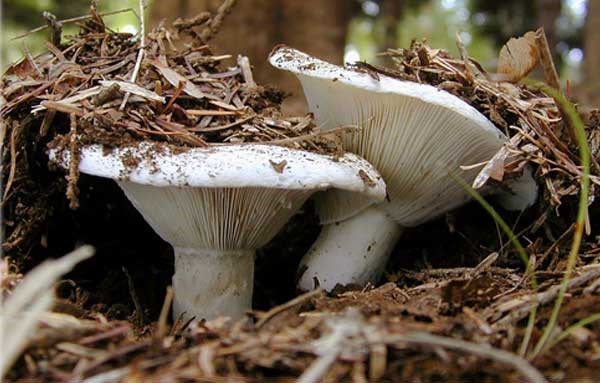
Under a layer of fallen leaves, the load is sometimes difficult to notice.
The rapid ripening of whites can be observed in the first half of autumn, especially if warm weather returns after a long cold snap. Moshkars at this time in the forest are almost gone, so most mushrooms during this period do not have wormholes.
Edible white load or not
White podgruzdok belongs to category III edible mushrooms. Despite the fact that it tastes rather mediocre, many mushroom pickers love this mushroom for its versatility.
Doubles of the white load and their differences
The white load has many doubles. Here is some of them.
- Russula is chlorineI (greenish podgruzdok). This mushroom grows mainly in deciduous forests in Western Siberia. It differs from dry weight only in the bluish-green color of the plates. The greenish podgruzdok is an edible mushroom, so there will be no negative consequences from its use.
- Violinist (squeaky, felt load). A widespread mushroom that visually resembles a dry milk mushroom. In contrast to the latter, a bitter-tasting milky juice is released on the cut of the violin. Because of this, the violin is almost never wormy. The violin is pure white in color (with the exception of older copies), there is usually much less debris and soil on it, while the cap itself has a velvety, pleasant to the touch surface. Skripun can be eaten after a long preliminary soaking in water, it is a conditionally edible species.
Important! If you hold a fingernail or other object over the surface of the cap, you can hear the characteristic creak, which is why this mushroom got its name.
- Pepper milk... This mushroom belongs to the milky, on the cut it secretes milky juice, very pungent in taste. Pepper mushrooms, like violin, are always cleaner than dry mushrooms. Moreover, he has a thicker leg. Despite the pungent taste, pepper milk can be eaten, but before that, it is necessary to stand it for a long time in running water to get rid of the milky juice.
- Volnushka white... This is also one of the representatives of the genus Millechnikov, therefore, at a cut or break in this mushroom, milky juice will certainly appear. White wolf is easy to distinguish from dry milkweed by its heavily pubescent and sometimes slimy cap. This mushroom is conditionally edible and can be eaten, however, a long soaking in water is required first.
What is the difference between raw milk and dry milk
Real, white milk mushrooms are most often called raw. Their caps are covered with a thin layer of mucus, which makes them wet to the touch. In addition, there are several more differences between raw milk mushrooms and dry ones.
- Yellowish color of the cap, on which darker concentric circles are poorly marked.
- Fringe on the hat.
- The edges are strongly tucked down and inward.
- The leg is hollow.
- Milky juice appears abundantly on the cut.
You can distinguish raw milk from dry milk not only by photo or appearance, but also by smell. True white has a strong specific aroma with fruity tones.
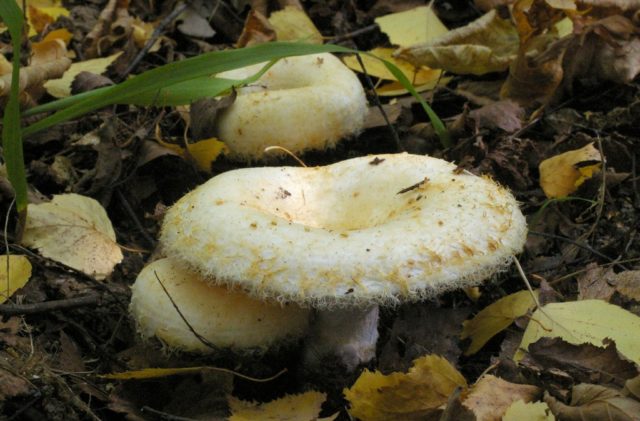
A real lump is a mushroom picker's dream
A raw (real) milk mushroom (pictured) is a much more valuable mushroom than a dry one. In terms of nutritional value, it belongs to I, the highest group, and is a welcome trophy for mushroom pickers.
How to distinguish dry milk from false
The easiest way to distinguish a crouton from other similar species is to inspect the cut. The release of white juice will unambiguously indicate that the mushroom belongs to the milkmen. The white cut will remain dry.
The benefits and harms of white loading
White podgruzdok contains in its composition a lot of substances useful for human health. It includes:
- amino acids;
- proteins;
- vitamins of group B, D, PP.
- trace elements.
The low calorie content of dry milk mushrooms allows them to be used as dietary products. Their regular use helps to improve blood circulation and cleanse blood vessels, helps maintain a high level of immunity.
However, it should be remembered that any mushrooms and porcini in particular are quite heavy food, and not every stomach can cope with them. It is not recommended to use them for young children, as well as for people with diseases of the gastrointestinal tract and with individual intolerance.
How to process dry milk mushrooms after harvest
Collected white piles must be processed as soon as possible, otherwise they will dry out and become brittle. As a rule, there is always a large amount of plant remains and soil on the caps, so it takes a long time and thoroughly to wash each specimen. Many mushroom pickers use an old hard-bristled toothbrush for this purpose.
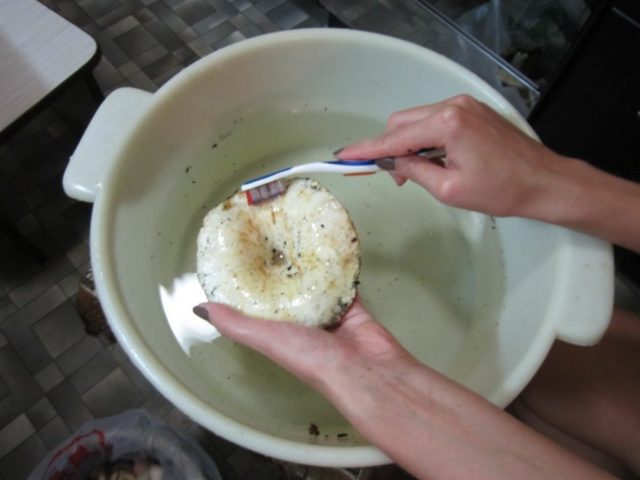
It is convenient to brush dry milk mushrooms with an old toothbrush
The white leg is usually separated at the stage of collection, it has no value. Completely washed dry milk mushrooms can be boiled, salted, pickled.
Are dry milk mushrooms soaked before cooking
In contrast to the milkmen, who are kept in water to remove the caustic milky juice, white pods are soaked only for the convenience of removing dirt from its surface. Usually it is enough to fill them for 15-20 minutes, after which it will be much easier to clean the cap of the sodden dirt. If the white pods are not very dirty, then they are simply washed under the stream without preliminary soaking.
What is made from white podgruzdki
The main method for preparing white podgruzdki is salting. Before that, the mushrooms are boiled for 15-20 minutes, and then put in jars in layers mixed with salt and spices. In addition to salting, other canning methods are also used, for example, pickling.
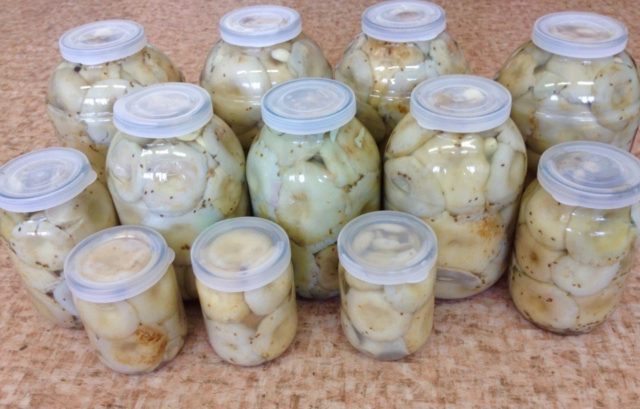
It is especially good to salt white lumps.
Fresh white podgruzdki can be added to soup, boiled and fried, from which you can prepare mushroom caviar and various sauces. They are stewed with meat and vegetables, used as a filling for pies. Freshly harvested mushrooms can be harvested for future use by drying or deep-freezing raw or boiled.
How to grow dry milk mushrooms at their summer cottage
If there are birches or aspens in the summer cottage, then you can try to grow white milk mushrooms or podgruzdki yourself. To do this, you need to purchase mushroom mycelium in a store or through a boarding school. Fruit bodies of dry mushrooms collected in the forest can be used for breeding mycelium, however, practice shows that the effectiveness of this method is extremely low. If you use ready-made mycelium, then the chances of getting a harvest are much higher.
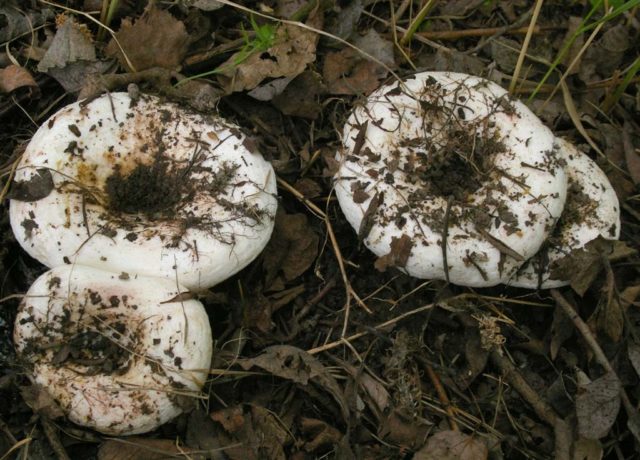
These are the mushrooms that can be grown near the house.
It is possible to sow white spores throughout the season. Next to any deciduous tree (preferably birch or aspen), small trenches are prepared with a depth of 12-15 cm.The planting material is evenly sown in them, and then covered with a mixture of humus and turf soil, mixed in a 1: 1 ratio.It will take about six months to form a full-fledged mycelium. In autumn (or spring, depending on planting time), you can get the first crop. After the formation of mycorrhiza with the roots of the tree, the mushrooms in this place will ripen annually, and this usually happens twice a season.
Conclusion
White podgruzdok is a mushroom beloved by many and has a universal culinary purpose. It is found much more often than a real milk mushroom, therefore, it is used more actively in homemade preparations. It is believed that the rusk does not have a pronounced taste, but the masters of mushroom pickling will not agree with this. And a huge number of recipes for preparing white podgruzdki only confirms their correctness.
